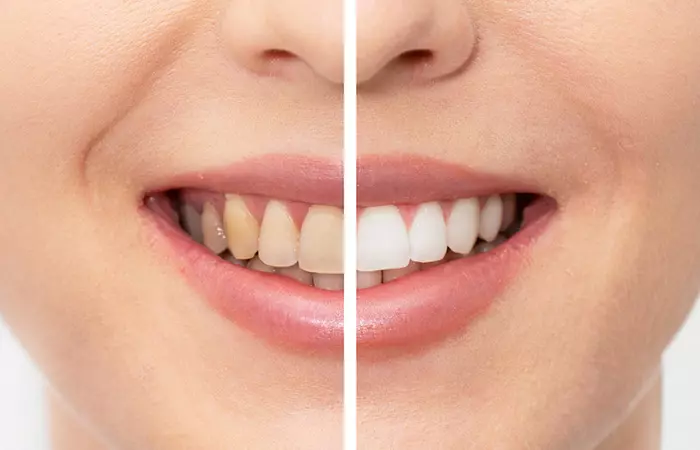10 Unexpected Side Effects Of Lemon Tea
Be aware of the adverse effects of excess consumption of this hot beverage.

Image: Midjourney/ StyleCraze Design Team
Lemon tea is a favorite for many people! Enriched with the antioxidative polyphenols of tea and immune-boosting capacities of vitamin C in lemons, it is a sure-shot way to boost your overall health! However, too much consumption can lead you to face the side effects of lemon tea as well! While it may come as a surprise to you, it’s better to be aware of the possible risks and concerns. This article breaks it down for you to know how much of lemon tea is just good enough for you!

 Know The Flip Side: Lemon Tea
Know The Flip Side: Lemon TeaShort-Term Effects
Heartburn, dehydration, canker sores, diarrhea, irritable bowel syndrome, and stomach ache.
Long-Term Effects
Enamel erosion, osteoporosis, osteomalacia, and Alzheimer’s.
Drug Interactions
It may interact with cholesterol and blood pressure medications.
When To See A Doctor
In case of toothache, heartburn, and digestive problems, visit a doctor immediately.
In This Article
Top 10 Lemon Tea Side Effects
Check out here some of the serious side effects of lemon tea. Read on to know more.
1. Tooth Erosion

People who consume lemon tea regularly may show signs of tooth enamel erosion. Lemon can be a silent killer for your teeth enamel, making your teeth susceptible to acute pain and sensitivity to sharp changes in temperature as lemon can cause higher erosivity (1).
 Quick Tip
Quick Tip2. Heartburn
Excessive consumption of lemon tea can alter the pH level of your stomach and intestine, causing acidic reflux where acid from your stomach moves up to your esophagusi A thin and muscular tube through which liquid and food pass from the throat to the stomach.
(2). This can cause a burning sensation in the chest and sometimes vomiting.
3. Dehydration

In extreme cases, lemon may work as a diuretic. That simply means it triggers dehydration in the body by a frequent urge to urinate. Consuming lemon tea quite frequently may prove dangerous and may cause dehydration in the body. Also, lemon tea is not very effective at restoring fluid balance after exercise-induced dehydration (3).
4. Canker Sores
Drinking too much lemon tea can irritate mucous membranes and potentially lead to canker sores (4). Lemon tea can play havoc in your mouth.
5. Unsafe For Pregnant Woman

Pregnant women are advised against the consumption of lemon tea as it contains caffeine. Excessive consumption of caffeine may trigger miscarriage or other severe side effects (5).
6. Unsafe For Lactating Mothers
Women who are breastfeeding their babies should also steer clear of lemon tea. Yes, it is refreshing – just what an exhausted new mother needs. But the caffeine from the tea gets blended with the breast milk and the baby may become more fussy or irritable due to this (6).
7. Osteoporosis

Lemon tea silently flushes out large amount of calcium from the body through urine, which may cause osteoporosis in the later stages of life (7).
8. Absorbs Aluminum
When you add lemon in your tea, the aluminum present in the tea gets absorbed in the body, which does not happen if you drink normal tea. This absorbed aluminum may cause toxicity in the body, which can lead to encephalopathyi A disorder in which a viral infection or toxins in the blood impairs the brain structure and functioning. , osteomalaciai A condition where the bones soften and break easily due to calcium or vitamin D deficiency. or aplastic bone disease, proximal myopathy, increased risk of infection, increased left ventricular mass and decreased myocardial function, and microcytic anemia with very high levels and even sudden death (8), (9).
9. Alzheimer’s

Studies have linked the intake of lemon tea with the chances of having Alzheimer’si A degenerative neurological condition that slowly destroys the brain cells and affects your memory and thinking. disease in later stages of life. Regular intake of lemon tea may cause accumulation of plaque in the brain, which has been linked to the onset of Alzheimer’s (10).
10. Stomach Problems
In some people, regular intake of lemon tea can result in stomach upset, causing stomach ache, diarrhea, irritable bowel syndrome, and even ulcer.
 Quick Tip
Quick TipIf you are still interested in trying out lemon tea, here’s how you can brew a cup at home.
Key Takeaways
- Drinking too much lemon tea may result in tooth erosion, stomach issues, diarrhea, and heartburn.
- Over consumption of lemon tea has been linked to early onset of Alzheimer’s.
- Avoid taking it too frequently or in large amounts during pregnancy.
How To Prepare Lemon Tea
Ingredients
- 1 cup of water
- 1 teaspoon of tea leaves
- Lemon juice (Freshly squeezed)
- Sugar or honey
How To Prepare
- Start by heating a cup of water.
- Once the water starts boiling, turn off the flame.
- Add in the tea leaves and allow it to steep in the water for 2-3 minutes.
- Stir in the freshly squeezed lemon juice.
- Add some sugar or honey for taste.
- Stir well before serving.
To boost lemon tea’s flavor and health benefits, add fresh mint leaves for a refreshing twist, ginger for its warm spice, or a pinch of turmeric for its vibrant color and anti-inflammatory properties.
Lemon tea can cause any of the side effects mentioned above, as well as a few other unexpected ones like insomnia, anxiety, and caffeine sensitivity, but that does not mean you have to refrain from your daily source of relaxation. All you need to do is be moderate in your portions. Don’t drink more than one cup a day and if possible, avoid having it first thing in the morning when your stomach is empty. If you experience symptoms like tooth sensitivity, stomach ache, or nausea, consider reducing your intake and consult your doctor to discuss lemon tea’s benefits and potential side effects in the context of your health. Otherwise, cheers to lemon tea!
Infographic: Most Common Side Effects Of Drinking Lemon Tea
Lemon tea is an immunity boosting refreshing drink preferred by many. While it does have many health benefits, overconsumption of lemon tea can cause a few unexpected side effects that seriously affect your health.
Scroll down and check out the infographic below to know the most common side effects of drinking too much lemon tea.
Some thing wrong with infographic shortcode. please verify shortcode syntax
Lemon tea is a tangy, refreshing beverage with rich antioxidativei A chemical, property, or drug that protects the cells against oxidative damage, which may lead to aging and cancer. polyphenols. It exhibits anti-inflammatory and anti-cancer properties that help treat several ailments. However, one must also be aware of the unexpected side effects of lemon tea with its excessive consumption. The tea may cause tooth erosion, heartburn, dehydration, canker sores, and may increase osteoporosisi A condition where the bones lose tissue and become brittle and weak due to age or medications. risk. It also may lead to diarrhea, irritable bowel syndrome, stomach ache, and ulcer. In addition, its overconsumption is unsafe for pregnant and lactating women. Hence, consume it in moderation. Consult your doctor if you have any preexisting medical conditions.
Frequently Asked Questions
Can lemon tea help with weight loss?
Yes, lemon tea may help with weight loss because of the lemon polyphenols. lemon polyphenols may help reduce weight and body fat by enhancing fat breakdown in the liver and improving insulin sensitivity. Including lemon in your diet could support weight management and overall health (12).
Is lemon tea good before bed?
Drinking lemon tea before bed can have both advantages as well as disadvantages. Melissa Baker, RDN, says, “Drinking lemon tea before bed can have some benefits, such as promoting relaxation and reducing stress due to the presence of certain compounds in lemon. However, if you have acid reflux or a sensitive stomach, drinking acidic beverages like lemon tea before bed may cause discomfort or worsen symptoms.”
Does lemon tea thin your blood?
Isaac Robertson, a registered nutritionist and personal trainer, says, “There is no scientific evidence to suggest that lemon tea can thin your blood. Lemon juice contains vitamin C, which can support healthy blood vessels and reduce inflammation. However, excessive consumption of lemon juice or tea may increase the acidity levels in your body, leading to digestive issues and potentially worsening certain medical conditions.”
Should lemon tea be hot or cold?
It is a matter of preference. Barbara Kovalenko, a nutritionist, says, “Both hot and cold lemon tea can be beneficial depending on personal preference. Hot lemon tea may help soothe a sore throat, while cold lemon tea can be a refreshing drink in hot weather.”
What happens if you drink lemon tea every day?
Lemon tea benefits your health in many ways. It exhibits many antioxidant and anti-inflammatory properties that help treat many ailments. From improving heart health to enhancing skin health, drinking lemon tea offers many benefits.
Does lemon tea make you poop?
Lemons are high in vitamin C, which can pull water into the gut. This, in turn, increases the water content inside the gut and may stimulate bowel movements.
Can I drink lemon tea at night?
Yes. The intake of lemon tea at night may regulate high blood sugar levels while sleeping. It is also a great alternative to water to keep you hydrated.
Does lemon tea raise blood pressure?
No. In fact, consumption of lemon tea may lower blood pressure levels. However, limited research is available in this regard.
Illustration: Unexpected Side Effects Of Lemon Tea

Image: Stable Diffusion/StyleCraze Design Team
While lemon tea is widely known for its benefits, it also has some side effects. Learn more about them in the following video!
References
Articles on StyleCraze are backed by verified information from peer-reviewed and academic research papers, reputed organizations, research institutions, and medical associations to ensure accuracy and relevance. Read our editorial policy to learn more.
- Influence of Various Acidic Beverages on Tooth Erosion. Evaluation by a New Method
https://www.ncbi.nlm.nih.gov/pmc/articles/PMC4452714/ - Acidic and neutral liquid ingestion in patients with gastroesophageal reflux disease
https://pubmed.ncbi.nlm.nih.gov/25296082/ - Effect of a carbohydrate-electrolyte beverage lemon tea or water on rehydration during short-term recovery from exercise
https://pubmed.ncbi.nlm.nih.gov/21813913/ - The effect of dietary habits on the development of the recurrent aphthous stomatitis
https://www.ncbi.nlm.nih.gov/pmc/articles/PMC3530246/ - Antenatal coffee and tea consumption and the effect on birth outcome and hypertensive pregnancy disorders
https://www.ncbi.nlm.nih.gov/pmc/articles/PMC5433714/ - Breastfeeding Special Circumstances
https://www.cdc.gov/breastfeeding-special-circumstances/hcp/diet-micronutrients/maternal-diet.html?CDC_AAref_Val=https://www.cdc.gov/breastfeeding/breastfeeding-special-circumstances/diet-and-micronutrients/maternal-diet.html - In vitro and in vivo study of effect of lemon juice on urinary lithogenesis
https://pubmed.ncbi.nlm.nih.gov/16482864/ - The Health Effects of Aluminum Exposure
https://www.ncbi.nlm.nih.gov/pmc/articles/PMC5651828/ - HUMAN HEALTH RISK ASSESSMENT FOR ALUMINIUM ALUMINIUM OXIDE AND ALUMINIUM HYDROXIDE
https://www.ncbi.nlm.nih.gov/pmc/articles/PMC2782734/ - Understanding Aspects of Aluminum Exposure in Alzheimer’s Disease Development
https://www.ncbi.nlm.nih.gov/pmc/articles/PMC8028870/ - A survey based study on etiological factors responsible for Dantaharsha with special reference to hypersensitive teeth
https://www.researchgate.net/publication/334082709_A_survey_based_study_on_etiological_factors_responsible_for_Dantaharsha_with_special_reference_to_hypersensitive_teeth
Read full bio of Mayuri Aavula
Read full bio of Tanya Choudhary
Read full bio of Ravi Teja Tadimalla
Read full bio of Moksha Gandhi

























Community Experiences
Join the conversation and become a part of our empowering community! Share your stories, experiences, and insights to connect with other beauty, lifestyle, and health enthusiasts.